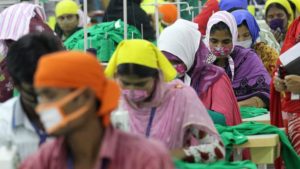Published in The Daily Star on Monday, 27 February 2017
MACRO MIRROR
 Just at the time when a major conference on the apparel sector of Bangladesh was held on February 25 in Dhaka with the promise to work together for a better tomorrow, disappointing news on labour rights in the readymade garments sector has surfaced. Eleven members of the US Congress have expressed their concerns regarding arrests and harassment of labour leaders and dismissal of workers from jobs. Their letter was sent to the Prime Minister of Bangladesh and to eleven buyers of Bangladesh’s RMG. Global concern over Bangladesh’s RMG sector is not new as global buyers and consumers are part of the industry. This has always taken the centre stage of discussion on the RMG sector. During the post-Rana Plaza period it has become all the more important.
Just at the time when a major conference on the apparel sector of Bangladesh was held on February 25 in Dhaka with the promise to work together for a better tomorrow, disappointing news on labour rights in the readymade garments sector has surfaced. Eleven members of the US Congress have expressed their concerns regarding arrests and harassment of labour leaders and dismissal of workers from jobs. Their letter was sent to the Prime Minister of Bangladesh and to eleven buyers of Bangladesh’s RMG. Global concern over Bangladesh’s RMG sector is not new as global buyers and consumers are part of the industry. This has always taken the centre stage of discussion on the RMG sector. During the post-Rana Plaza period it has become all the more important.
Since the Rana Plaza tragedy on April 24, 2013 buying companies have started working with suppliers to improve compliance. A number of measures have been undertaken through collaboration with Bangladeshi entrepreneurs, e.g. Accord on Fire and Building Safety, Alliance of Bangladesh Worker Safety and Partnership for Cleaner Textile. Major compliance measures have been undertaken to ensure safety of factories and workers. The labour law of the country has been amended and the right to form trade unions in factories including in the special economic zones has been approved. The minimum wage of RMG workers has been raised to USD 69 in November 2013, in an attempt to make it comparable to other competing countries. These initiatives helped to develop standards and ensure transparency and compliances. As a result, RMG exports continued to increase and reached USD 28.09 billion in FY2015-16, despite some periodic fluctuations.

While compliance measures have helped to bring more credibility of the RMG sector, this is not a one off initiative. This is an ongoing process and has to be pursued continuously for sustainable growth of the sector. It is encouraging to note that RMG entrepreneurs have accepted compliance as an integral part of their business to survive. Many are taking self-motivated initiatives to remain ahead of the curve and to achieve and maintain competitiveness. This is also useful since with the planned departure of Accord and Alliance in June 2018, monitoring the safety issues in factories will have to be continued with similar rigour by the entrepreneurs themselves. The role of the government, Bangladesh Garment Manufacturers and Exporters Association (BGMEA), buyers and development partners will be critical in following up compliance measures.
But the road ahead is quite challenging. Good things do not come cheap. With higher compliance related expenditures, the cost of doing business goes up. This gives stiff price competition to the entrepreneurs. In such a situation some may opt for reduced production capacity to make up for additional expenditures on compliance requirements. But as the industry aims for apparel exports of USD 50 billion by 2021, production capacity has to increase further and faster.
Fulfilment of such objectives will rely on collaborative efforts of multi-stakeholders. Indeed, sustainable growth of the industry is a shared responsibility of all parties including manufacturers, buyers, workers, government, civil society and media. Entrepreneurs should continue to maintain higher compliance in a sustainable manner. The Ashulia incident and the global reaction in its aftermath are not helpful for the sector. Wages and labour rights related issues have to be taken into cognizance seriously and resolved immediately. If the sector can invest so much for safety and technological upgradation, it can also increase labour wages. In the short run, increase in labour costs does lead to higher production costs. But the increase is not significant, as many global studies reveal. Moreover, in the long-run these costs are internalised by higher productivity.
RMG manufacturers have to meet the increased cost of production through higher productivity and moving to high value products and high end markets. Higher productivity will require state of the art technology and skill development. Hardworking Bangladeshi workers are ready to put extra labour to learn technical skills. However, the issue of technology and its impact on the employment has to be thought of seriously. In the wake of the fourth industrial revolution which is going to rely heavily on technology, robots will take away many human jobs. Modern sectors will fall prey to such innovation first. Of course, this is an issue for the policymakers who have to generate employment and engage the excess labour force in other sectors. RMG entrepreneurs have to think of training workers in order to adapt to technological transformation.
Buyers, another major stakeholder, have to collaborate with suppliers in improving productivity. Ironically, in a fiercely competitive market, brands and retailers look for the lowest price. Buyers source from Bangladesh to maximise their profits through cheap clothes. Ethical buying and fair price are not under the purview of profit-making brands. If that was so then some other competing countries would have been dropped from their sourcing list. Some companies are seeking to reduce costs further by sourcing from low-cost countries. Southeast Asia and Sub-Saharan regions are under their consideration. This emphasises the need for higher productivity and stricter compliance. The government can provide some relief on the cost of production through better infrastructural facilities and energy, competitive interest rate and better exchange rate. Civil society and media can help create awareness among consumers about ethical buying and act as a watchdog for compliance. Finally, trust gap among various stakeholders has to be minimised through better understanding and more transparency.
The writer is Research Director at the Centre for Policy Dialogue.

